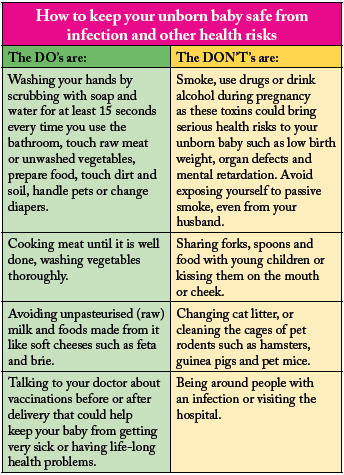Pregnancy is a time of great anticipation. It is also a time for great care and precaution as infections abound and can infect the unborn child in a severe way. The most common infections are:
- Chickenpox is caused by the varicella zoster virus. If caught in the first 13 to 20 weeks of pregnancy, it will result in a 1% to 2% risk of the baby developing eye problems, paralysis or deformity of limbs, or even brain damage. After 20 weeks, there is no risk. However, if chickenpox is caught within seven days before birth, the newborn baby may develop a severe form of chickenpox.
- German measles (rubella) can cause miscarriage, stillbirth, or birth defects, such as deafness, brain damage, heart defects and cataracts. If the mother acquires the infection in the first 12 weeks of pregnancy, over 70% of babies will be affected to varying degrees.
- Cytomegalovirus (CMV) is a “silent” disease, spread primarily through the saliva or urine of under six children through the sharing of food, drinks and eating utensils, or kissing them on the mouth or cheek. Symptoms of CMV infected babies include liver, lung and spleen problems, jaundice, vision loss, a small head and mental retardation, lack of coordination, seizures and death.
- Hepatitis simply means an inflammation of the liver. Hepatitis B (HBV) transmitted to the unborn child may develop chronic HBV infection, cirrhosis of the liver or liver cancer.
- Herpes is a sexually transmitted disease (STD). Active genital herpes can be spread to the baby during delivery and can be potentially fatal. Caesarean delivery is usually recommended.
- Toxoplasmosis is an infection caused by a parasite called Toxoplasma gondii found in cat faeces. Some infected babies show symptoms ranging from chorioretinitis (eye damage), enlargement of the liver and spleen, jaundice, seizures, a small or big fluid-filled head and/or brain damage.




Comments